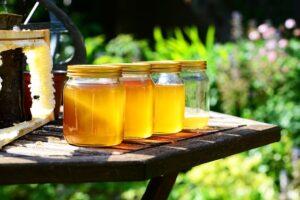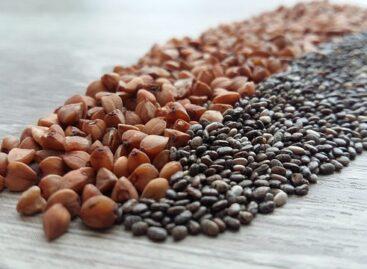Domestic honey labeling rules are getting stricter
For years, our country has been advocating for the tightening of the European regulations for marking the origin of honey mixtures in order to protect consumers and beekeepers. Due to the slowness of the EU process, Hungary is tightening the domestic regulations under national competence, in the case of honey mixtures, it will be mandatory to indicate all countries of origin, in descending order of the weight of the honey used, said Minister of Agriculture István Nagy.

(Photo: Pixabay)
The minister reminded that the protection of both consumers and beekeepers is of prime importance to the Hungarian government. Unfair market competition caused by honey from third countries outside the EU, often of dubious origin, is a huge sales problem for Hungarian beekeepers in the EU market, to which we traditionally export 80% of our honey production, he added.
István Nagy explained that the labeling of honey is regulated by the council’s directive on honey at the community level
According to this, the country of origin where the honey was collected must be indicated on the label. However, in the case of a honey mixture from several countries, it is not mandatory to indicate the countries of origin, it is enough to indicate that it is a honey mixture from EU countries, non-EU countries or EU countries and non-EU countries. Based on the experience of the past years, this marking method is used to cover up the real country of origin, as increasingly aware customers have already become sensitive to the reliability of the food’s country of origin. It is no coincidence that together with Hungary, twenty member states jointly requested the tightening of EU regulations on the origin marking of honey mixtures in January of this year, explained the minister. He emphasized that since the review of the EU directive is still ongoing, the Ministry of Agriculture – after the necessary European Union approval process – amended the regulations of the Hungarian Food Code in such a way that even in the case of honey mixtures, all countries of origin must be indicated, in descending order according to the weight of the honey used. The new provisions will enter into force on August 11, starting from this date a six-month transition period begins, during which honeys labeled according to the previous rules can be put on the market and kept on the market until their shelf life expires. After that, stricter rules apply to all honey mixes on domestic market, the minister underlined.
With the measure now in force, consumers’ right to fair information is asserted
It will be clear to the increasingly aware Hungarian consumers which are the reliable, high-quality Hungarian products on the honey market. This increases the consumption of domestically produced honey and helps Hungarian honey producers. As he said, in order to restore the position of honey export, which is of central importance for Hungarian beekeeping, and to maintain European beekeeping and honey production, it is essential to tighten the honey labeling rules at the EU level, which is why the Ministry of Agriculture, together with allied countries, continues to urge the revision and amendment of the EU directive as soon as possible. Consumers have the right to know whether the honey mixture they want to buy contains Chinese, Ukrainian or even Hungarian honey, emphasized the head of the ministry. István Nagy pointed out that, in addition to advocating for the cleaning of the EU honey market, the Ministry of Agriculture provides special assistance to beekeeping in the support period of the Common Agricultural Policy until 2027, as well as in the national support system, explained István Nagy.
AM
Related news
European Court of Auditors: EU Commission proposals affecting the common agricultural policy may cause uncertainty
🎧 Hallgasd a cikket: Lejátszás Szünet Folytatás Leállítás Nyelv: Auto…
Read more >Related news
GDP growth in OECD member countries slowed to 0.3 percent in the last quarter of last year
🎧 Hallgasd a cikket: Lejátszás Szünet Folytatás Leállítás Nyelv: Auto…
Read more >







